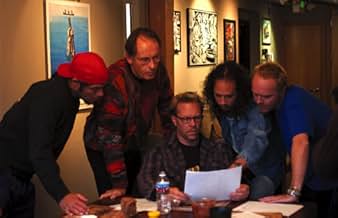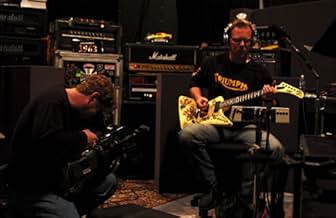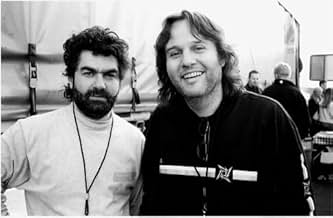The iconic metal band struggles for two years to create their album St. Anger, dealing with alcoholism, the loss of their bass player, and the challenge of working with a psychotherapist.The iconic metal band struggles for two years to create their album St. Anger, dealing with alcoholism, the loss of their bass player, and the challenge of working with a psychotherapist.The iconic metal band struggles for two years to create their album St. Anger, dealing with alcoholism, the loss of their bass player, and the challenge of working with a psychotherapist.
- Awards
- 6 wins & 4 nominations total
Cliff Burton
- Self
- (archive footage)
Steffan Chirazi
- Self
- (as Stefan Chirazi)
Featured reviews
10Jeddia
This is probably the first documentary about Metallica that didn't make you feel good. All of the older documentaries show a band that was personable and fun-loving, rocking like no one else can. They showed us the Metallica we were proud to call ourselves fans of. But with Some Kind of Monster , we see a band full of weather-beaten rock stars, burned out (an understatement), tired, desperate, and aggravated. It broke my heart to watch this, but it was a damn fine documentary.
Frankly, I'm glad this was released. Because the average semi-informed fan of Metallica (like myself), has only seen the headlines over the past ten years - which served to make the band look like they were becoming complete pricks. I love Metallica. But the wall of negative stuff that was thrown at us in the past decade has tainted our view of the band. This documentary straightens some of it out. While I don't believe that was the goal of the film, it is a fortunate side-effect.
I know the Metallica of the 80's is gone - beer flying, 9-minute epic metal songs, and the long hair - but hopefully, our favorite rockers still have the fire within to bring us a few more great albums. Metallica showed the world that heavy metal (and I mean *heavy*) didn't have to use gimmicks and make-up to be mainstream. All it needed was the right attitude and talented musicians to play it. I've seen them live nearly 20 times. Nobody can do it like Metallica. Nobody.
Frankly, I'm glad this was released. Because the average semi-informed fan of Metallica (like myself), has only seen the headlines over the past ten years - which served to make the band look like they were becoming complete pricks. I love Metallica. But the wall of negative stuff that was thrown at us in the past decade has tainted our view of the band. This documentary straightens some of it out. While I don't believe that was the goal of the film, it is a fortunate side-effect.
I know the Metallica of the 80's is gone - beer flying, 9-minute epic metal songs, and the long hair - but hopefully, our favorite rockers still have the fire within to bring us a few more great albums. Metallica showed the world that heavy metal (and I mean *heavy*) didn't have to use gimmicks and make-up to be mainstream. All it needed was the right attitude and talented musicians to play it. I've seen them live nearly 20 times. Nobody can do it like Metallica. Nobody.
It's 2001. Metallica is making a new album and rents out space in the Presidio. Bassist Jason Newsted had left the band in frustration and starts his own band. The group is in therapy to work out their dysfunctional relationship. They continue to fight as front man James Hetfield leaves to enter rehab. Former Metallica guitarist Dave Mustaine explains the effects of his ejection from the group to Lars Ulrich and Kirk Hammett even with his subsequent success with Megadeth. After a year, James finally returns with new focus on sobriety and less time on the music. They slowly try to rebuild the band with new bassist Robert Trujillo.
This is a brave documentary from Metallica. They're showing many of the ugly struggles behind the scenes. It is personal and messy. The most compelling scene is Dave Mustaine's breakdown reunion. James and Lars' complicated work marriage with each other fills most of the rest of the movie. It's not necessarily a fun watch but it is interesting. It's probably much more compelling for Metallica fans but it's also a human story for everybody else.
This is a brave documentary from Metallica. They're showing many of the ugly struggles behind the scenes. It is personal and messy. The most compelling scene is Dave Mustaine's breakdown reunion. James and Lars' complicated work marriage with each other fills most of the rest of the movie. It's not necessarily a fun watch but it is interesting. It's probably much more compelling for Metallica fans but it's also a human story for everybody else.
They mention, in the documentary, that maybe the film won't make money. It didn't. About a month after release, it's relegated to single late-night showings, and hasn't even earned one million dollars, nationwide, according to boxofficemojo. That's sad.
The film starts out unintentionally funny. They bring in the overpaid shrink who starts blathering on to the extent you expect Hetfield to stand up and tell him to get gone. But, no, Hetfield actually has an epiphany, thanks to 'Dr. Phil'. It's only at the end, if one sits through this thing, that you see 'Dr. Phil'. thinking of selling the homestead and moving to Bev-r-ley with that $40K a month paycheck (it's more than a lot a lawyers get), when Hetfield and Ulrich sort of cuss him out, tell him the gravy train is slowing down, and Hetfield dismissively leaves saying, Ah, let's play some music. But he still thanks the 'doc' later on. The whole thing is just sad to see. Even so, however comical his epiphany, getting off addiction is still very worthwhile. A shame it couldn't have been a little less embarrassing for Jim.
As good a guitarist a Kirk may be, this film makes him out to be not merely 'egoless', because he's clearly not, but practically effeminate. He seems more himself on his ranch. And he falls back into 'the wimp' role when he's with the band. Maybe if he just wore boots and a white Stetson he'd remember who he is a little better. I don't know.
Lars seems like some squirrely brat, most of the time. His father tells him not to settle. But Dad's in there bopping his head up and down to some truly awful tunes. The 'St. Anger' album was maybe the band's worst. But everyone was playing by the old rules, the old template, and thought there would be big money in this.
That's what they tell Trujillo, who actually had some life to his playing - for what one thinks of brain-dead Ozzy, he sure has picked his sidemen well. They give him the million up front. I wonder if he ever saw much more beyond that? They should have cashed him out for more than that! He harked back to the energy of Mustaine and Hetfield. Even Mustaine has the 'wimp factor' on his side, in this film, nowadays.
Did Metallica have to be toasted to play and compose like Metallica? Did they have to be 'monsters' to write Orion, or Master of Puppets? I don't agree. Or is that to argue that Trujillo is completely zonked in this film? I don't see that. I think the anger is real. I think the anger, the pettiness, particularly of Ulrich, is real in this film. I don't think it's put on. But the difference is that the style of metal is limited. And they don't want to try variations on the old themes, which is really the only way they'd maintain their success. They can't bring themselves to do that. And they don't want to become a folk, or pop band - or a jazz band.
So they play around in the Presidio, and goof in the studio, and have the greedy yes men saying that a least a few songs are outstanding (none were). But they want to try something new. And they've got nothing. They look like amateurs, not the band that released Nothing Else Matters, and so many others.
If they can't go back to the drawing board, if they just can't bring themselves to do that, or if there is just no longer any inspiration or nothing more to steal, then perhaps with a Trujillo they could openly recapture the first Garage Days effort where they cover 'Dope'head and Sabbath and others. They played Sabra Cadabra as well as Rhoades or Zakk. It was a great cover of that song. Some of the other covers were outstanding, even the Skynyrd stuff.
If they can't build on Puppets or Nothing Else or the rest, then maybe they could just re-establish themselves exclusively as a top cover band and cover Alice Cooper (as with the Humanary Stew album, arguably one of the best cover/tribute albums ever made). There's so much they could cover, so many bands and songs that may never otherwise really 'break through'. And then they wouldn't be so bored out of their minds that they might release another film such as this, even in the hope it might earn so much a cool million (after expensese, etc).
They'll be missed.
The film starts out unintentionally funny. They bring in the overpaid shrink who starts blathering on to the extent you expect Hetfield to stand up and tell him to get gone. But, no, Hetfield actually has an epiphany, thanks to 'Dr. Phil'. It's only at the end, if one sits through this thing, that you see 'Dr. Phil'. thinking of selling the homestead and moving to Bev-r-ley with that $40K a month paycheck (it's more than a lot a lawyers get), when Hetfield and Ulrich sort of cuss him out, tell him the gravy train is slowing down, and Hetfield dismissively leaves saying, Ah, let's play some music. But he still thanks the 'doc' later on. The whole thing is just sad to see. Even so, however comical his epiphany, getting off addiction is still very worthwhile. A shame it couldn't have been a little less embarrassing for Jim.
As good a guitarist a Kirk may be, this film makes him out to be not merely 'egoless', because he's clearly not, but practically effeminate. He seems more himself on his ranch. And he falls back into 'the wimp' role when he's with the band. Maybe if he just wore boots and a white Stetson he'd remember who he is a little better. I don't know.
Lars seems like some squirrely brat, most of the time. His father tells him not to settle. But Dad's in there bopping his head up and down to some truly awful tunes. The 'St. Anger' album was maybe the band's worst. But everyone was playing by the old rules, the old template, and thought there would be big money in this.
That's what they tell Trujillo, who actually had some life to his playing - for what one thinks of brain-dead Ozzy, he sure has picked his sidemen well. They give him the million up front. I wonder if he ever saw much more beyond that? They should have cashed him out for more than that! He harked back to the energy of Mustaine and Hetfield. Even Mustaine has the 'wimp factor' on his side, in this film, nowadays.
Did Metallica have to be toasted to play and compose like Metallica? Did they have to be 'monsters' to write Orion, or Master of Puppets? I don't agree. Or is that to argue that Trujillo is completely zonked in this film? I don't see that. I think the anger is real. I think the anger, the pettiness, particularly of Ulrich, is real in this film. I don't think it's put on. But the difference is that the style of metal is limited. And they don't want to try variations on the old themes, which is really the only way they'd maintain their success. They can't bring themselves to do that. And they don't want to become a folk, or pop band - or a jazz band.
So they play around in the Presidio, and goof in the studio, and have the greedy yes men saying that a least a few songs are outstanding (none were). But they want to try something new. And they've got nothing. They look like amateurs, not the band that released Nothing Else Matters, and so many others.
If they can't go back to the drawing board, if they just can't bring themselves to do that, or if there is just no longer any inspiration or nothing more to steal, then perhaps with a Trujillo they could openly recapture the first Garage Days effort where they cover 'Dope'head and Sabbath and others. They played Sabra Cadabra as well as Rhoades or Zakk. It was a great cover of that song. Some of the other covers were outstanding, even the Skynyrd stuff.
If they can't build on Puppets or Nothing Else or the rest, then maybe they could just re-establish themselves exclusively as a top cover band and cover Alice Cooper (as with the Humanary Stew album, arguably one of the best cover/tribute albums ever made). There's so much they could cover, so many bands and songs that may never otherwise really 'break through'. And then they wouldn't be so bored out of their minds that they might release another film such as this, even in the hope it might earn so much a cool million (after expensese, etc).
They'll be missed.
The debate over whether or not Michael Moore's `Fahrenheit 9/11' should be called a `documentary' won't be heard hovering around Joe Berlinger and Bruce Sinofsky's (`Brother's Keeper,' `Paradise Lost') `Metallica: Some Kind of Monster' because it is a documentary, an accurate rendering of the rock group's long struggle to create its latest album, `St. Anger.' Although sex and drugs play no role in the film and the groupie adulation is almost non present, making even the most out-of touch viewer skeptical, the battle of frontman James Hetfield with alcohol and the group with dysfunction has the feel of authenticity. We are left with a business partnership reviving its product.
By engaging `performance-enhancement coach' Phil Towle for $40,000 a month, Metallica puts its money where its mouth is-a serious effort to preserve the magic of a group that sold 90 million albums, so much a product of delicate personality bonding that the full time therapist had a real challenge to preserve the indefinable chemistry. Beside Hetfield's demons, drummer Lars Ulrich's Napster battle takes energy from the group, so Towle is probably a small investment in its survival. If heavy metal is not your thing, seeing this group psychodrama would be worth the admission.
Not seeming to fit the overall clinical activity of the film is a scene of Ulrich selling his art collection. Critic Ed Gonzalez gives an insightful explanation:
`There's a moment in the film where Berlinger and Sinofsky force a fascinating correlation between the paintings that hang in Ulrich's home and the music the band makes, calling attention to the relationship between art and the spectator and the way that art is consumed. This scene has absolutely nothing to do with the psych sessions between Metallica and Towle, and it's a great one.'
This kind of organic unity makes it a documentary of artful proportions. I still prefer classical and folk music, but I have to admit to a new interest in a musical genre I can share with my musician grandson Cody.
By engaging `performance-enhancement coach' Phil Towle for $40,000 a month, Metallica puts its money where its mouth is-a serious effort to preserve the magic of a group that sold 90 million albums, so much a product of delicate personality bonding that the full time therapist had a real challenge to preserve the indefinable chemistry. Beside Hetfield's demons, drummer Lars Ulrich's Napster battle takes energy from the group, so Towle is probably a small investment in its survival. If heavy metal is not your thing, seeing this group psychodrama would be worth the admission.
Not seeming to fit the overall clinical activity of the film is a scene of Ulrich selling his art collection. Critic Ed Gonzalez gives an insightful explanation:
`There's a moment in the film where Berlinger and Sinofsky force a fascinating correlation between the paintings that hang in Ulrich's home and the music the band makes, calling attention to the relationship between art and the spectator and the way that art is consumed. This scene has absolutely nothing to do with the psych sessions between Metallica and Towle, and it's a great one.'
This kind of organic unity makes it a documentary of artful proportions. I still prefer classical and folk music, but I have to admit to a new interest in a musical genre I can share with my musician grandson Cody.
I saw this film at the True/False Film Festival in Columbia, Missouri, and was fortunate enough to hear some Q&A from the director after.
The two words that best describe Some Kind of Monster are "brutally honest." This is a no-holds-barred look at a band that has played together for two decades and is on the verge of disintegration from internal conflict, external pressures and creative stagnation. We see the members of Metallica not as icons, but as flawed individuals in a close, but often tumultuous relationship that has lasted longer than many marriages. At a fundamental level the seem to love each other, but as with many long-term relationships, they sometimes reach the point that they cannot stand the sight of one another.
Can they survive? Well, the mystery is obviously abated by knowing how the story ends (the production of the album St. Anger and the subsequent tour); but it in no way detracts from this interesting examination of the process of separation and reconciliation.
Central to the story is not only tension the band members experience in once again trying to bottle the lightning of musical success, but the fundamental changes taking place in James Hetfield's life as he enters rehabilitation for drug and alcohol addiction. While Hetfield's personal battle takes place off-screen, we see the powerful impact it is having on the rest of the group.
Some truly standout moments include the interaction between Lars Ulrich and his father Torben (an amusing and brutally honest character); the long-delayed meeting between Lars and Dave Mustaine (who was kicked out of the band in the early 80s and went on to found Megadeath); a long band meeting which consists mainly of screaming obscenities; the band's search for a new bassist; and the almost surreal scene of Hetfield attending his daughter's ballet recital.
If you wish to see the members of Metallica as icons, then Some Kind of Monster is probably not for you; however, if you would like an up-close view of them as very real human beings, then I highly recommend this film. Love them or hate them, you will bring something away from Some Kind of Monster.
The two words that best describe Some Kind of Monster are "brutally honest." This is a no-holds-barred look at a band that has played together for two decades and is on the verge of disintegration from internal conflict, external pressures and creative stagnation. We see the members of Metallica not as icons, but as flawed individuals in a close, but often tumultuous relationship that has lasted longer than many marriages. At a fundamental level the seem to love each other, but as with many long-term relationships, they sometimes reach the point that they cannot stand the sight of one another.
Can they survive? Well, the mystery is obviously abated by knowing how the story ends (the production of the album St. Anger and the subsequent tour); but it in no way detracts from this interesting examination of the process of separation and reconciliation.
Central to the story is not only tension the band members experience in once again trying to bottle the lightning of musical success, but the fundamental changes taking place in James Hetfield's life as he enters rehabilitation for drug and alcohol addiction. While Hetfield's personal battle takes place off-screen, we see the powerful impact it is having on the rest of the group.
Some truly standout moments include the interaction between Lars Ulrich and his father Torben (an amusing and brutally honest character); the long-delayed meeting between Lars and Dave Mustaine (who was kicked out of the band in the early 80s and went on to found Megadeath); a long band meeting which consists mainly of screaming obscenities; the band's search for a new bassist; and the almost surreal scene of Hetfield attending his daughter's ballet recital.
If you wish to see the members of Metallica as icons, then Some Kind of Monster is probably not for you; however, if you would like an up-close view of them as very real human beings, then I highly recommend this film. Love them or hate them, you will bring something away from Some Kind of Monster.
Did you know
- TriviaAll the footage for the film was comprised of 1600 hours of footage and was cut down to 2 Hours and 20 minutes.
- Quotes
[Metallica is asked to record a radio promo]
Lars Ulrich: Hey it's Lars from Metallica. I'm about to stick 50 grand up your ass...
James Hetfield: ...One dollar at a time.
- ConnectionsEdited from MTV News (1989)
- SoundtracksFrantic
Performed by Metallica
Written by James Hetfield (as Hetfield), Lars Ulrich (as Ulrich), Kirk Hammett (as Hammett),
Bob Rock (as Rock)
Courtesy of Elektra Entertainment Group
By Arrangement with Warner Strategic Marketing
Published by Creeping Death Music (ASCAP) and EMI Blackwood Music (Canada) Ltd./Mahina Hoku Publishing (SOCAN),
© 2003
- How long is Metallica: Some Kind of Monster?Powered by Alexa
Details
- Release date
- Country of origin
- Official site
- Language
- Also known as
- Metallica: Подібний монстру
- Filming locations
- Production companies
- See more company credits at IMDbPro
Box office
- Gross US & Canada
- $1,222,708
- Opening weekend US & Canada
- $46,359
- Jul 11, 2004
- Gross worldwide
- $1,980,444
- Runtime2 hours 21 minutes
- Color
- Sound mix
- Aspect ratio
- 1.33 : 1
Contribute to this page
Suggest an edit or add missing content

Top Gap
By what name was Metallica: Some Kind of Monster (2004) officially released in India in English?
Answer



























